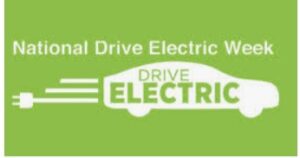by David Goldstein, Ventura County PWA
 In a world where energy demand by data centers for artificial intelligence, cryptocurrency and other uses is expected to double by 2026, do we still have room on local electric grids for a major boost in electric vehicle usage? According to the “Energy 2024” report of the International Energy Agency, an intergovernmental body under the umbrella of the Organization for Economic Cooperation and Development, electric cars will have to compete with data centers increasing consumption from 460 terawatt-hours in 2022, to possibly more than 1,000 in 2026. This demand by data centers will be “roughly equivalent to the electricity consumption of Japan,” according to the report.
In a world where energy demand by data centers for artificial intelligence, cryptocurrency and other uses is expected to double by 2026, do we still have room on local electric grids for a major boost in electric vehicle usage? According to the “Energy 2024” report of the International Energy Agency, an intergovernmental body under the umbrella of the Organization for Economic Cooperation and Development, electric cars will have to compete with data centers increasing consumption from 460 terawatt-hours in 2022, to possibly more than 1,000 in 2026. This demand by data centers will be “roughly equivalent to the electricity consumption of Japan,” according to the report.
Kent Bullard, Field Representative for the Electric Vehicle Advocates of Ventura County, says many EV owners are prepared to help gird electric grids for the challenge. Bullard points to the solar panels on his roof in Ventura, and also to three batteries. Rather than drawing more power during peak periods, many, like Bullard, choose battery settings that provide a net benefit for grid resilience.
Bullard’s first two batteries, Tesla Powerwalls, are compact, rechargeable lithium-ion batteries that store energy from the grid and his solar panels. He keeps it at 20 percent reserve, chooses the “time-based control” setting, and subscribes to a 4 PM to 9 PM “time of use” rate structure from Southern California Edison. These three details are crucial for anyone wanting to benefit, rather than burden, the grid. The reserve level determines how much electricity he will keep in the battery at all times in case of an outage, the “control” setting determines whether your battery will discharge to the grid any electricity above the storage minimum, and the rate structure dictates when this discharge will occur.
These settings direct batteries to accumulate electricity when rates are low, which is also when electricity is more plentiful, and to “sell electricity back” to the utility at times of day when electricity is in shorter supply and rates are high.
Bullard’s third battery is in his new Cybertruck. “Once I get the Cybertruck’s system hooked up, I will be able use it like the Powerwall, but it’s almost 10 times bigger,” he said. Vehicle-to-grid and vehicle-to-home charging is an increasingly popular feature of electric vehicles, so it will greatly expand the number of future EV owners who can choose the three regenerative settings for bolstering the grid.
At my own home, one of my battery settings is not as virtuous as Bullard’s. My family keeps our battery at 50 percent reserve. My defense is personal trauma. Our home was damaged by the Thomas Fire and my wife’s work-from-home was interrupted by the many Public Safety Power Shutoffs and neighborhood reconstruction-related power outages that followed, so we may be overly cautious. Maybe we will relax and help the grid more during peak hours if power becomes scarce.
In celebration of National Drive Electric Week, Bullard and his group are coordinating electric vehicle promotions. On Sunday, October 6, noon to 4:30 p.m., at Ventura Harbor, EV Advocates, Ventura County Regional Energy Alliance (VCREA), and others will display cars and staff educational booths with information about incentives and opportunities for purchase of electric vehicles. The showcase of electric vehicles, on the main lawn, will include cars, vans, SUVs, trucks, bikes electric equipment, and vintage vehicle conversions displayed by their owners, who will be available to answer questions.
If you go to an EV event, ask the car owners whether they own a home-charging battery, and if they do, ask them, “What are your preferred settings?”
David Goldstein, Environmental Resource Analyst with the Ventura County Public Works Agency, may be reached at (805) 658-4312 or [email protected]
